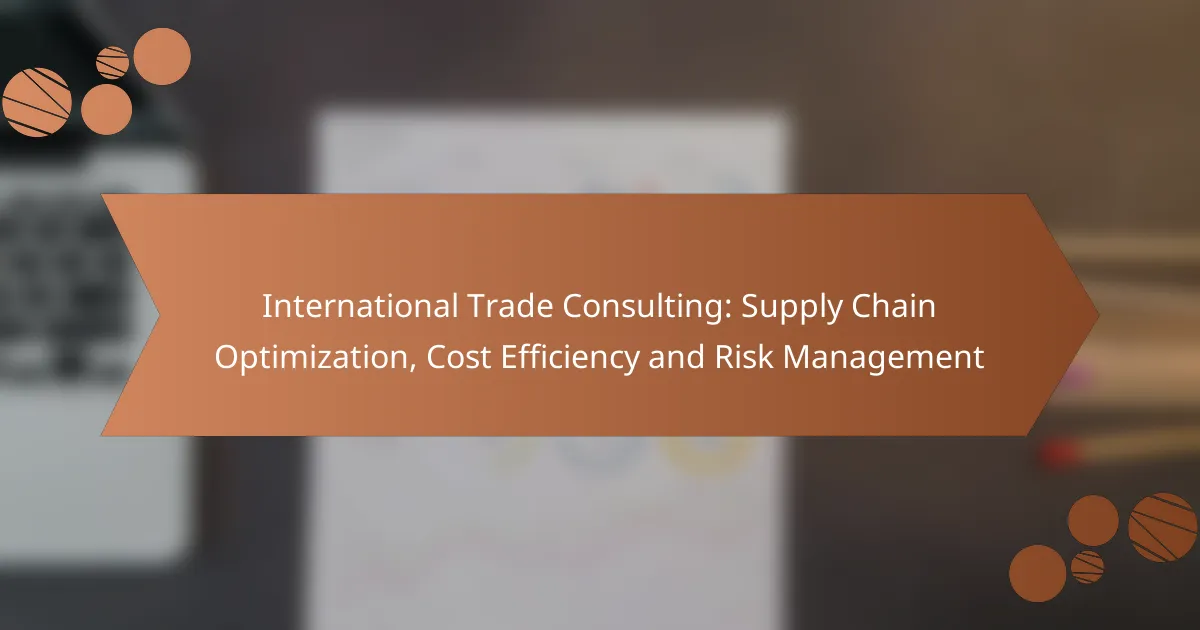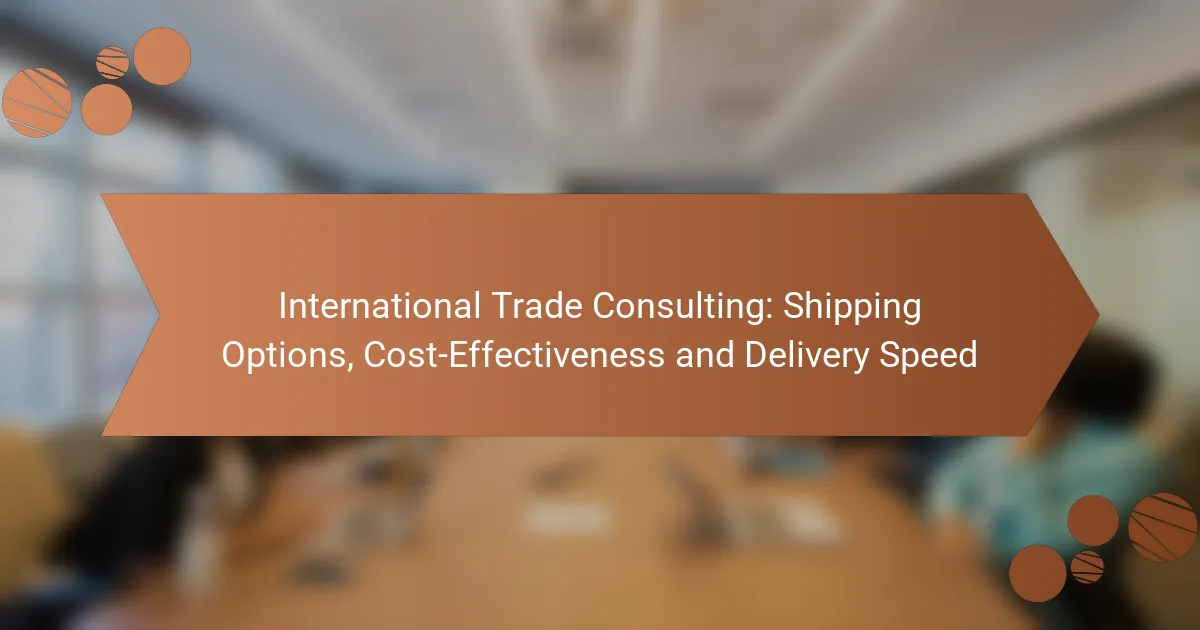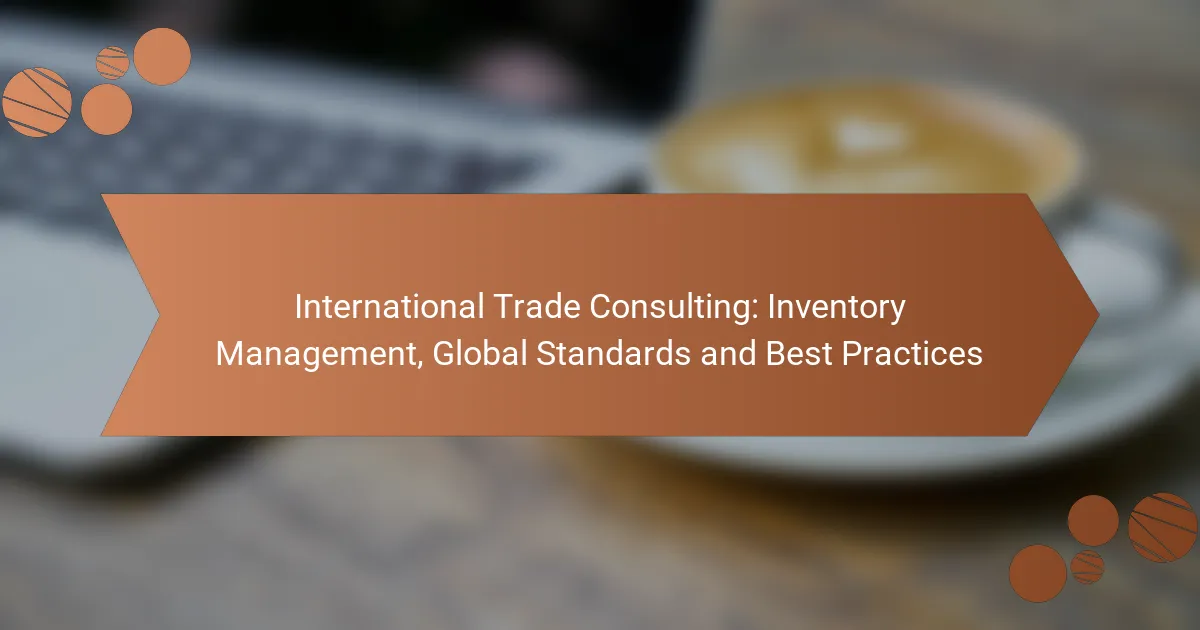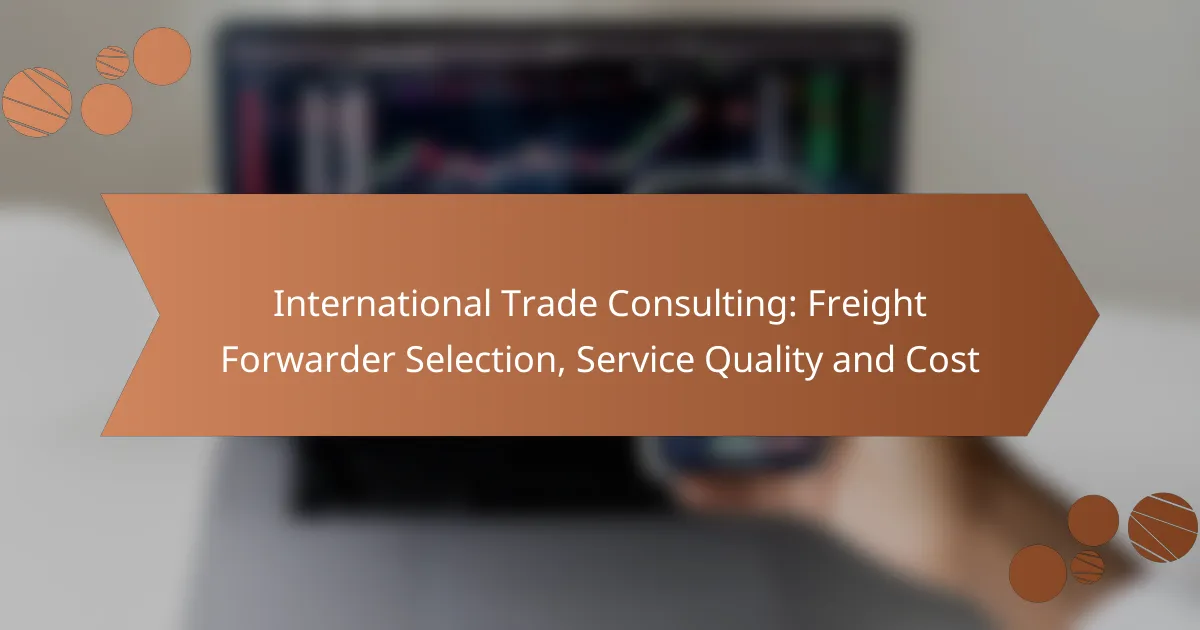International trade consulting plays a vital role in optimizing supply chains by pinpointing inefficiencies, enhancing cost efficiency, and managing risks effectively. By utilizing expert insights and data analytics, businesses can streamline their operations, leading to improved performance and profitability. Additionally, robust risk management strategies are essential for identifying and mitigating potential disruptions, ensuring compliance and operational continuity in a competitive global market.
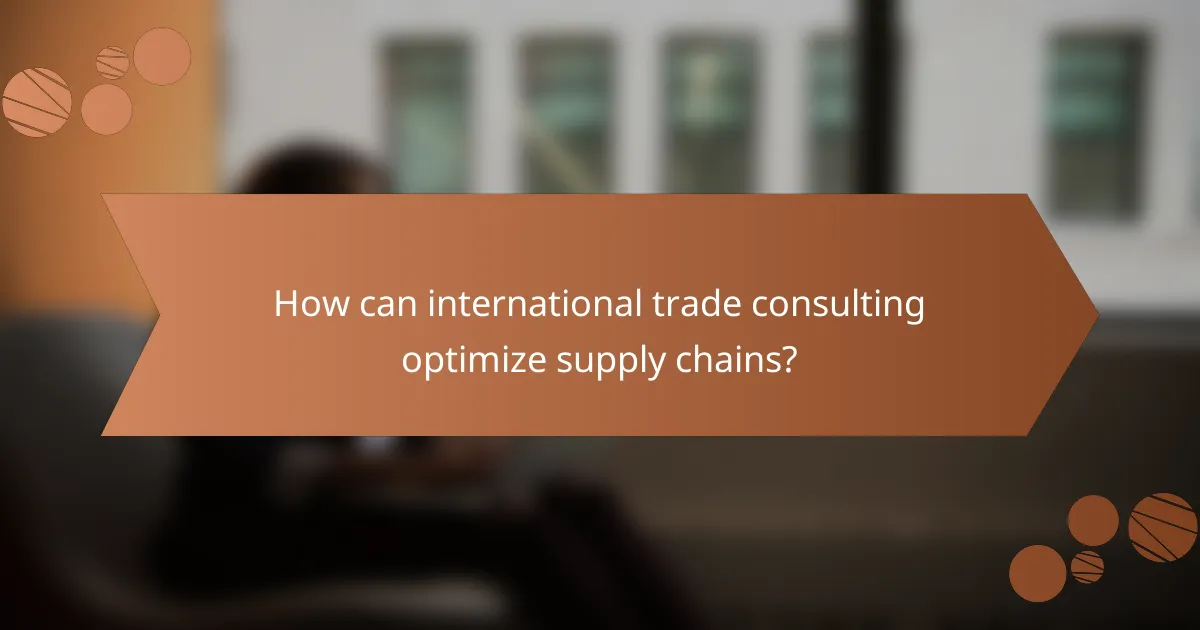
How can international trade consulting optimize supply chains?
International trade consulting can significantly enhance supply chains by identifying inefficiencies, reducing costs, and managing risks. By leveraging expert insights and data analytics, businesses can streamline operations and improve overall performance.
Streamlined logistics management
Streamlined logistics management focuses on optimizing the movement of goods from suppliers to customers. This involves analyzing transportation routes, selecting the most efficient carriers, and minimizing delays. For example, using a centralized logistics platform can reduce shipping times by coordinating multiple shipments effectively.
Consider implementing just-in-time (JIT) delivery systems to further enhance efficiency. JIT reduces inventory holding costs and ensures that products arrive exactly when needed, minimizing excess stock and storage expenses.
Enhanced inventory control
Enhanced inventory control involves maintaining optimal stock levels to meet demand without overstocking. Techniques such as ABC analysis can help prioritize inventory management efforts based on the value and turnover rate of items. This ensures that high-value items are closely monitored while less critical stock is managed with less frequency.
Utilizing inventory management software can provide real-time visibility into stock levels, helping businesses make informed decisions about reordering and reducing the risk of stockouts or excess inventory. Regular audits and cycle counts are also essential to maintain accuracy.
Data-driven decision making
Data-driven decision making leverages analytics to inform supply chain strategies. By analyzing historical data and market trends, businesses can forecast demand more accurately and adjust their supply chain operations accordingly. This approach minimizes risks associated with sudden market changes.
Implementing key performance indicators (KPIs) can help track the effectiveness of supply chain initiatives. Common KPIs include order fulfillment rates, lead times, and inventory turnover, which provide insights into areas needing improvement.
Supplier relationship management
Supplier relationship management is crucial for optimizing supply chains. Building strong partnerships with suppliers can lead to better pricing, improved quality, and more reliable delivery schedules. Regular communication and collaboration foster trust and can lead to mutually beneficial agreements.
Consider conducting supplier evaluations to assess performance and identify areas for improvement. Establishing clear expectations and performance metrics can help maintain high standards and ensure that suppliers align with your business goals.

What cost efficiency strategies are available for e-commerce?
Cost efficiency strategies for e-commerce focus on reducing expenses while maintaining quality and service levels. Implementing these strategies can lead to significant savings and improved profitability.
Bulk purchasing agreements
Bulk purchasing agreements involve negotiating contracts with suppliers to buy large quantities of products at discounted rates. This strategy can lead to substantial cost savings, as suppliers often provide lower prices for higher volume orders.
When considering bulk purchasing, evaluate your inventory turnover rates to avoid overstocking. Aim for agreements that allow flexibility in order quantities to adapt to market demand.
Automated procurement processes
Automated procurement processes streamline the purchasing workflow by using technology to manage orders, inventory, and supplier interactions. This reduces manual errors and speeds up the procurement cycle, leading to cost savings.
Investing in procurement software can help track spending and supplier performance. Look for solutions that integrate with existing systems to maximize efficiency and minimize disruptions.
Cost-benefit analysis tools
Cost-benefit analysis tools help e-commerce businesses evaluate the financial implications of various strategies and investments. These tools allow companies to compare potential costs against expected benefits, guiding decision-making.
Utilize software that provides clear visualizations of costs and benefits, making it easier to assess different scenarios. Regularly update your analyses to reflect changing market conditions and operational needs.
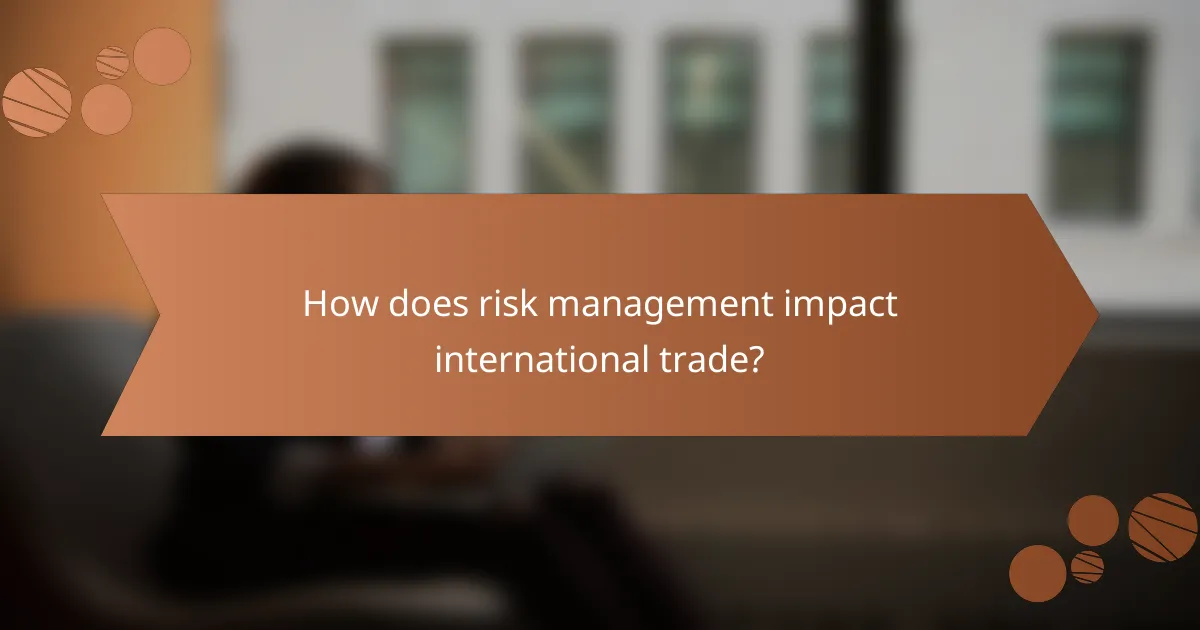
How does risk management impact international trade?
Risk management is crucial in international trade as it helps businesses identify, assess, and mitigate potential disruptions in their supply chains. Effective risk management enhances cost efficiency and ensures compliance with regulations, ultimately safeguarding profitability and operational continuity.
Identification of supply chain vulnerabilities
Identifying supply chain vulnerabilities involves analyzing each segment of the supply chain to pinpoint potential risks, such as supplier reliability, transportation delays, and geopolitical instabilities. Businesses should conduct regular assessments to evaluate their exposure to these risks and prioritize them based on their potential impact.
Common vulnerabilities include reliance on a single supplier, inadequate inventory levels, and lack of visibility into logistics. Utilizing tools like risk assessment matrices can help visualize and categorize these vulnerabilities effectively.
Mitigation strategies for geopolitical risks
To mitigate geopolitical risks, companies should diversify their supplier base across different regions to reduce dependency on any single country. Establishing relationships with multiple suppliers can provide alternatives in case of political unrest or trade restrictions.
Additionally, businesses should stay informed about geopolitical developments and adjust their strategies accordingly. This may involve stockpiling essential goods or investing in local production facilities to minimize exposure to international disruptions.
Compliance with international regulations
Compliance with international regulations is essential for minimizing legal risks and avoiding penalties. Companies must familiarize themselves with trade laws, tariffs, and import/export regulations in the countries they operate in. Regular training and updates on compliance requirements can help maintain adherence.
Implementing a compliance management system can streamline processes and ensure that all aspects of international trade operations meet regulatory standards. This includes maintaining accurate documentation and conducting audits to identify any compliance gaps.

What are the prerequisites for effective consulting?
Effective consulting in international trade requires a strong foundation in key areas such as global trade regulations, market trends, and analytical tools. These prerequisites enable consultants to optimize supply chains, enhance cost efficiency, and manage risks effectively.
Understanding of global trade regulations
A thorough understanding of global trade regulations is essential for effective consulting. This includes knowledge of customs laws, tariffs, and trade agreements that vary by country and region. For instance, consultants should be familiar with the World Trade Organization (WTO) rules and any bilateral agreements that may impact their clients.
Consultants must also stay updated on changes in regulations, as these can significantly affect supply chain operations. Regularly reviewing resources such as government publications and trade association updates can help maintain compliance and avoid costly penalties.
Knowledge of market trends
Knowledge of market trends is crucial for identifying opportunities and threats in international trade. Consultants should analyze economic indicators, consumer behavior, and competitive landscapes to provide actionable insights. For example, understanding shifts in demand for specific products can guide clients in adjusting their supply chain strategies.
Staying informed about emerging markets and technological advancements can also enhance a consultant’s effectiveness. Utilizing industry reports and market research can provide valuable context for decision-making and strategy development.
Access to analytical tools
Access to analytical tools is vital for effective consulting in supply chain optimization. These tools can range from software for data analysis to platforms for tracking shipments and inventory. Utilizing advanced analytics can help consultants identify inefficiencies and recommend improvements.
Consultants should consider tools that offer real-time data and predictive analytics capabilities. This allows for proactive decision-making and better risk management. Regular training on these tools can also enhance a consultant’s ability to leverage data effectively for their clients’ benefit.

How can technology enhance supply chain efficiency?
Technology enhances supply chain efficiency by automating processes, improving data accuracy, and enabling real-time decision-making. By leveraging advanced tools, businesses can streamline operations, reduce costs, and mitigate risks associated with supply chain disruptions.
Implementation of AI-driven analytics
AI-driven analytics can significantly improve supply chain efficiency by analyzing vast amounts of data to identify patterns and predict trends. This allows companies to optimize inventory levels, forecast demand more accurately, and enhance supplier selection processes.
For instance, using AI algorithms, a retailer can analyze purchasing behavior and adjust stock levels accordingly, reducing excess inventory by up to 30%. Companies should ensure they have the right data infrastructure in place to support these analytics tools.
Utilization of blockchain for transparency
Blockchain technology enhances supply chain transparency by providing a secure and immutable record of transactions. This allows all parties involved in the supply chain to access real-time information about product origins, shipment status, and compliance with regulations.
For example, a food distributor can use blockchain to trace the journey of products from farm to table, ensuring quality and safety standards are met. Companies should consider integrating blockchain solutions to improve trust and reduce fraud in their supply chains.
